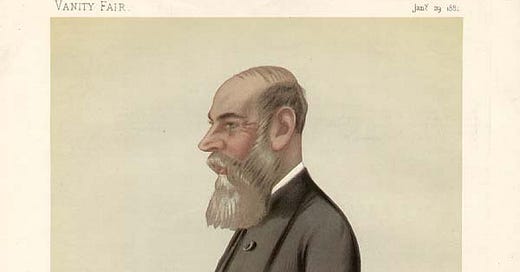boycott
verb
UK /ˈbɔɪ.kɒt/ US /ˈbɔɪ.kɑːt/
To refuse to buy a product or take part in an activity as a way of expressing strong disapproval
Obviously you knew this, but I hadn’t appreciate it comes from a person.
Charles Cunningham Boycott (1832 - 1897) was an English land agent who became infamous after he was ostracised by his local community in Ireland.
Charles was a retired English army officer who went over to Ireland to work for a local landowner. As agent, his job was to collect rents and evict tenants.
In 1880, Charles tried to evict 11 tenants. A political movement called The Irish Land league had started the year before, and urged locals to withdraw their labour and generally shun dear old Charles.
He then made the classic mistake of writing to the press - an early example of the Streissand effect. His letter was published in The Times:
“Sir, The following detail may be interesting to your readers as exemplifying the power of the Land League. On the 22nd September, a process server, escorted by a police force of seventeen men, retreated to my house for protection, followed by a howling mob of people, who yelled and hooted at the members of my family.
“On the ensuing day, September 23rd, the people collected in crowds upon my farm, and some hundred or so came up to my house and ordered off, under threats of ulterior consequences, all my farm laborers, workmen, and stablemen, commanding them never to work for me again.
“My blacksmith has received a letter threatening him with murder if he does any more work for me, and my laundress has also been ordered to give up my washing. A little boy, twelve years of age, who carried my post-bag to and from the neighboring town of Ballinrobe, was struck and threatened on 27th September, and ordered to desist from his work.
“The shopkeepers have been warned to stop all supplies to my house, and I have just received a message from the postmistress to say that the telegraph messenger was stopped and threatened on the road when bringing out a message to me. My farm is public property; the people wander over it with impunity. My crops are trampled upon, carried away in quantities, and destroyed wholesale.
“The locks on my gates are smashed, the gates thrown open, the walls thrown down, and the stock driven out on the roads. I can get no workmen to do anything, and my ruin is openly avowed as the object of the Land League unless I throw up everything and leave the country.
CHARLES C. BOYCOTT
It became a global sensation and eventually led to the army being called in to safeguard the harvest. Apparently the whole debacle cost around £10k in order to harvest £500 worth of crops.
And with that, his surname became a verb.




